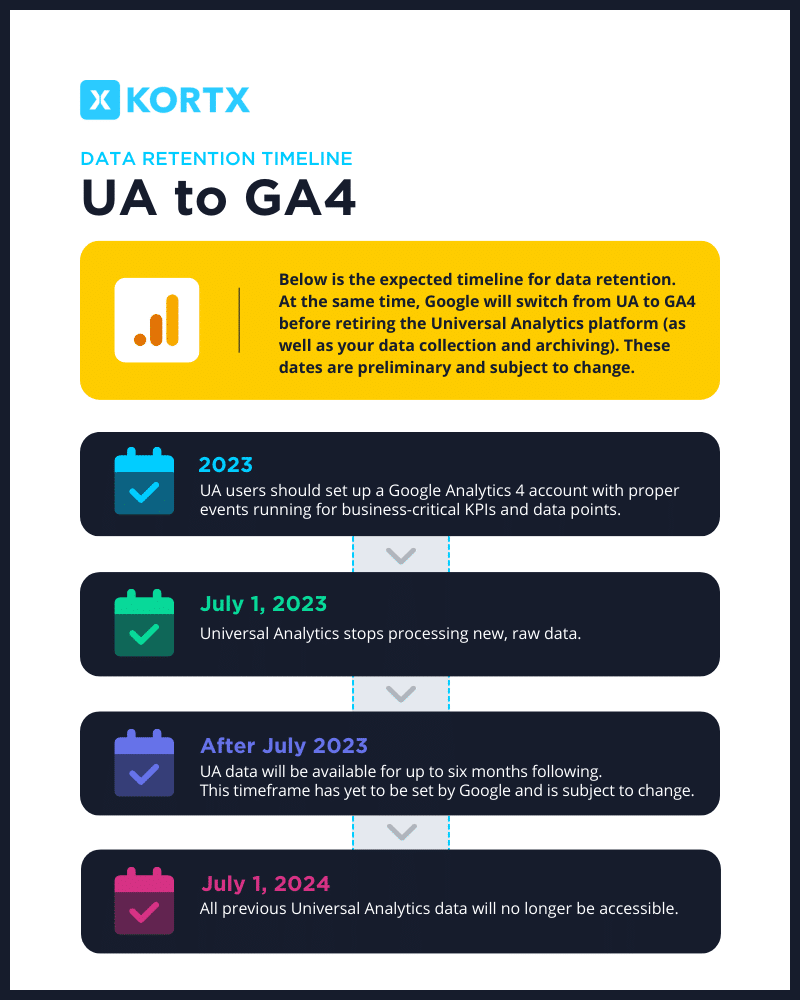Want to put a marketer into cold sweats? Let them know all their data disappeared overnight! Soon enough, this will be a reality for any marketer’s data currently stored in the Universal Analytics (UA) platform.
Likely, Google will continue to provide an updated timeline for users, but downloading all that data is not as easy as it sounds. If your team wishes to archive any Google Analytics data from the past few years, a plan should be in place as soon as possible!
What’s the value of archiving Universal Analytics Data?
“Understanding what past performance looks like is vital for future planning. Data archiving can look like more work than it is worth, but you will be doing your team a disservice if you cut off access to past data. Benchmarking and future planning will not be accurate if you do not know how your customers acted in the past.”

UA stopped collecting data in July 2023, but it’s unclear how long that data will be available following. Google has said it could be available for up to six months, but this timeline could undoubtedly change.
Regardless, we know Universal Analytics data will not be accessible or downloadable from the platform at some point. With any platform switch, it’s important to establish a convenient but thorough data archiving plan.
Below, we’ve outlined the best way to archive your data from Universal Analytics in prep for the upcoming change.
Why is archiving previous Google Analytics data important?
Access to data from your campaigns from the past two to three years is essential for reporting and benchmarking. It can help answer questions regarding seasonal trends, growth, and more. This is especially important for marketing as you dig deeper into specific channels and pages. It allows you to separate the trends from the outliers. It will help you strengthen reporting and analysis that covers an extended period. Additionally, you never know when your team may need the old data, so do yourself a favor and save it!
What does data retention mean?
Data retention refers to the time a platform or service will save and hold onto data. Generally, platforms such as Google Analytics will only keep data for a certain period before it is eventually deleted or removed. This could happen for various reasons, including user privacy, data storage, memory, and more.
What is the difference between data retention and data archiving?
Data retention refers to data held for a defined and limited period. For example, a platform will retain data for six months to a year. This depends on business priorities as well as perceived usability/feasibility. Data archiving refers to saving data ostensibly for a very long time.
Data archives may not be used consistently but are stored and able to be accessed. Think of the two like a museum. Retention refers to all the artifacts and art on display. Archiving refers to all the older stuff saved in the archives in the basement.
What’s the value of archiving Universal Analytics Data?
“Understanding what past performance looks like is vital for future planning. Data archiving can look like more work than it is worth, but you will be doing your team a disservice if you cut off access to past data. Benchmarking and future planning will not be accurate if you do not know how your customers acted in the past.”

UA to GA4 Data Retention Timeline
Below is the expected timeline for data retention. At the same time, Google will switch from UA to GA4 before retiring the Universal Analytics platform (as well as your data collection and archiving). These dates are preliminary and subject to change.
- Today: UA users should set up a Google Analytics 4 account with proper events running for business-critical KPIs and data points.
- July 1, 2024: Universal Analytics stops processing new, raw data.
- After July 2024: UA data will be available for up to six months following. This timeframe has yet to be officially set by Google and is subject to change.
- December 2024 & Beyond: All previous Universal Analytics data will no longer be accessible.

Core differences between UA and GA4 data
The main difference between the two Google Analytics platforms is how data is collected and labeled. Google Analytics 4 labels all previous “Hit Types” as events. This needs to be set up individually by the account owner. This includes page views and screen views.
It is also important to note that the data collection logic between the two platforms differs, meaning that you should not compare UA data directly to GA4 data, even if they are technically the exact measurement (pageviews, screenviews, visitors, etc.).
☑️ ☑️ ☑️ To explore a comprehensive list of the differences between Universal Analytics vs. Google Analytics 4, check out our blog post: Google Analytics 4 vs. Universal Analytics: Differences You Should Know.
How to Archive Data from Universal Analytics
Due to the differences between UA and GA4, you will be unable to migrate data from one platform to the other. Despite this, it is wise to archive your data for the future as eventually, Google will shut down the platform and take your years of data with it. There are several core ways you can do this.
- Manually to Excel (Most Time Consuming, Free) – UA analytics allows you to export all your data manually. This might be the one for you if you need a free and straightforward solution. Determine what information you need, export it into Excel or a CSV, and save it to your local computer or cloud storage. KORTX recommends keeping some channel and campaign-specific data as this file will be complicated to work with in the future.
- Semi-Manually to Google Sheets (Time Consuming, Free) – Another solution is to utilize the Google Analytics Add-On available on Google Sheets. You will need to follow a similar process as the Excel process above. This solution, however, allows you to save all data to Google Drive, making it easy to share across teams and users.
- More Streamlined Paid Solutions (Time Consuming, Subscriptions Required) – If your team is hoping to DIY your archiving in-house but prefers a streamlined approach, it might be worth the money to explore solutions from subscriptions such as BigQuery and Supermetrics.
- Hire an Agency or Data Partner (Time-Saving, Budget Required). While hiring an agency to help with your data archiving does require a budget, it also allows your team to continue to manage their day-to-day work without worrying about the future. Consider hiring a partner (like KORTX) to handle the core parts of the transition for you. This option allows you to rely on subject matter experts who likely understand the most crucial data points and can organize your Google Analytics data archive in a way your team will utilize in the future.
Thriving in the Ever-Evolving Digital Marketing Landscape
Succeeding in digital marketing requires efficient resource management. Digital marketers face numerous challenges. These challenges can be overcome with careful planning, strategic measures, continuous learning, and adaptation.
By setting realistic expectations, staying informed, leveraging data-driven insights, prioritizing key channels, optimizing workflows, and making data-driven decisions, digital marketers can achieve meaningful results and thrive in the ever-evolving landscape of 2023 and beyond.
⚒ We’re here for your data needs!
Does hiring a data partner sound like the solution for you?
KORTX can help you with the transition to GA4, archiving your Universal Analytics data, and creating dashboards to get the most out of your archived and current data!
Can I transfer data from UA to GA4?
No. Your data can not transfer data from Universal Analytics to Google Analytics 4. The two data platforms have different methodologies for collecting data. The data from one to the other is not one-to-one or entirely comparable.
Will Universal Analytics be discontinued?
Yes. Google will be discontinuing Universal Analytics in 2024. The platform will stop collecting data at the beginning of July 2024. Eventually, the platform will shut down entirely. Likely six months to a year following data stop.
How do I transition from UA to GA4?
Transferring from Universal Analytics to Google Analytics 4 requires your team to set up a GA4 account, apply the new tracking code, and set up events and personalization features, as needed. Check out: How Do I Prepare for Google Analytics 4: Setup and Transition Checklist.
Losing your past Google Analytics data from older platforms such as Universal Analytics or Google Analytics 360 does not have to happen.
Explore data archiving options for your critical KPIs or all of your data before it is too late. This data will be necessary for the future and it’s important to have a data archiving plan in place before the data disappears. While it’s easy to take what information you have right now for granted, it’s important to act today and get ahead of the game.
🫤
Sound complicated?
To KORTX, it sounds like fun!
We’d love to help your team archive your data.
About the Author
Sean Stojanovski is an Oakland University Grad who loves the KORTX life and is a food connoisseur.
